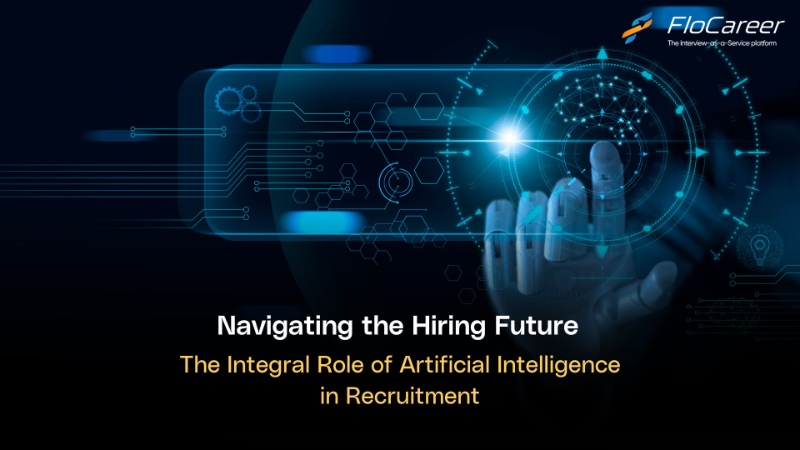Navigating the Hiring Future: The Integral Role of Artificial Intelligence in Recruitment
A Paradigm Shift in Talent Acquisition
The landscape of recruitment has undergone a significant transformation with the integration of Artificial Intelligence (AI). In this comprehensive guide, we delve into the multifaceted role of AI in recruitment, exploring its benefits, challenges, and the profound impact it holds on the industry's future.

Read: Deep Dive into Best Practices with Interview Outsourcing Platform
Revolutionizing Recruitment with AI: Unveiling the Benefits
1. Automation of Tasks:
Transformation: AI's pivotal advantage lies in automating time-consuming tasks like resume screening and candidate sourcing.
Efficiency Boost: Recruiters can redirect their focus towards strategic activities, enhancing overall efficiency in the recruitment process.
2. Data-Driven Decision-Making:
Transformation: AI analyzes vast datasets, aiding recruiters in making informed decisions.
Strategic Insights: AI-powered algorithms predict candidate suitability, aligning job requirements with the right candidates effectively.
3. Improved Candidate Experience:
Transformation: Personalized recommendations and instant responses are facilitated by AI-driven chatbots.
Enhanced Satisfaction: Candidates benefit from timely communication, creating a positive experience throughout the recruitment journey.
4. Identifying Top Talent:
Transformation: AI algorithms analyze resumes to identify key skills and experiences relevant to job requirements.
Efficient Selection: Recruiters save time and ensure consideration of the most qualified candidates for positions.
5. Reduction of Bias:
Transformation: AI's impartial algorithms counteract unconscious biases inherent in human recruiters.
Fair and Inclusive: The recruitment process becomes fairer and more inclusive, fostering diversity within organizations.
6. Streamlining Candidate Screening:
Transformation: AI tools swiftly scan through resumes, eliminating those not meeting minimum requirements.
Effort Savings: Recruiters save significant time and effort, focusing on evaluating the most promising candidates.
7. Enhanced Accuracy in Candidate Matching:
Transformation: AI algorithms precisely match job requirements with candidate qualifications.
Reduced Hiring Risks: Ensures the identification of best-fit candidates, minimizing the risk of wrong hiring decisions.
8. Cost Savings and Long-term Benefits:
Transformation: Initial investments in AI may pose challenges, but long-term benefits include cost savings through streamlined processes.
Strategic Evaluation: Careful assessment of cost-benefit ratios ensures optimal utilization of AI technology.
10. Personalized Learning Paths for Skill Development:
- Transformation: AI identifies skill gaps in the recruitment team.
- Professional Development: Recruiters receive personalized learning paths, enhancing their skills in leveraging AI effectively.
11. Predictive Analysis for Future Talent Needs:
- Transformation: AI's predictive capabilities extend to foreseeing future talent requirements.
- Strategic Planning: Recruiters can proactively plan for upcoming talent needs, aligning recruitment strategies with organizational goals.
12. Improved Collaboration with Cross-functional Teams:
- Transformation: AI facilitates seamless collaboration between recruiters and other departments.
- Enhanced Efficiency: Cross-functional data sharing ensures a holistic approach to talent acquisition, maximizing overall organizational efficiency.
13. Customizable AI Integration for Diverse Hiring Needs:
- Transformation: AI systems can be tailored to meet the specific needs of different industries.
- Versatility: Recruiters can customize AI integration to align with the unique demands of diverse sectors, ensuring optimal results.
14. Ethical AI Audits for Transparent Recruitment Practices:
- Transformation: Periodic audits ensure the ethical use of AI in recruitment.
- Transparency: Recruiters can showcase commitment to fairness and transparency, building trust with both candidates and stakeholders.
15. Seamless Integration with Applicant Tracking Systems (ATS):
- Transformation: AI seamlessly integrates with existing ATS.
- Enhanced Workflow: Recruiters experience a smooth and efficient workflow, combining the strengths of AI and ATS for comprehensive recruitment management.
Read: The Profound Benefits of Workplace Diversity
Navigating Challenges: Ethical AI Implementation and Training Needs
1. Addressing Bias Concerns:
Challenge: Potential bias in AI algorithms requires careful design and monitoring.
Solution: Diversity and inclusion initiatives, training AI on diverse datasets, and regular audits help mitigate bias risks.
2. Training and Understanding AI Systems:
Challenge: Recruiters need adequate training to leverage AI effectively.
Solution: Investing in training programs ensures recruiters possess the necessary knowledge to navigate AI in the recruitment process.
3. Financial Considerations:
Challenge: Implementing AI systems can be costly, particularly for small businesses.
Solution: Evaluate cost-benefit ratios and explore options like cloud-based AI solutions or partnerships with AI service providers for flexibility and scalability.
Future Horizons: Evolving AI's Role in Recruitment
1. Advancements in Data Analysis:
Future Vision: AI's evolution includes more sophisticated data analysis, predicting a candidate's compatibility and suitability with greater accuracy.
2. Inclusivity and Diversity Enhancement:
Future Vision: AI has the potential to enhance diversity by focusing on objective data, identifying talent from underrepresented groups, and ensuring a fair hiring environment.
3. Automation of Mundane Tasks:
Future Vision: AI chatbots handling initial candidate interactions, scheduling interviews, and conducting assessments.
Efficiency Gains: Automation of repetitive tasks allows recruiters to engage in more strategic activities.
4. Enhanced Candidate Screening Efficiency:
Future Vision: AI-powered tools scanning and analyzing resumes to identify the most qualified candidates.
Time Savings: Improved efficiency reduces the risk of overlooking potential talent.
AI's Current Impact: A Data-Driven Transformation
1. Data-Driven Decision-Making:
Transformation: AI enables evidence-based insights for recruiters, fostering more accurate assessments of candidates' qualifications.
Future Integration: Advancements in natural language processing and machine learning will enhance AI's analytical capabilities.
2. Streamlined Sourcing and Screening:
Transformation: AI platforms efficiently search for candidates with required skills.
Future Integration: Continued evolution of AI will result in even quicker and more precise candidate matches.
3. Personalized Candidate Experiences:
Transformation: AI-driven interactions create personalized experiences for candidates.
Future Integration: AI will further enhance chatbot capabilities, providing tailored recommendations and engaging interactions.
The AI-Infused Future of Recruitment
Artificial Intelligence has become a cornerstone in the recruitment industry, offering unprecedented benefits in automating processes, improving decision-making, and enhancing the overall candidate experience. As we move forward, addressing challenges, implementing ethical practices, and embracing the evolving landscape of AI will undoubtedly shape the future of talent acquisition.
Unlock Unbiased Interviews with FloCareer:
Elevate your recruitment process by outsourcing interviews with FloCareer. Our AI-driven platform ensures unbiased assessments, providing a fair and inclusive hiring environment. Experience the future of recruitment with FloCareer and witness the transformative power of unbiased, data-driven decision-making.
Read: FloCareer’s OnDemand Interviews & Interview as a Service Platform


